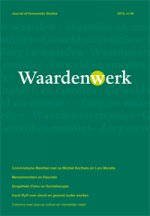
Aging, Meaning, and Health: Humanistic Contributions to Better Lives and Better Societies
Productgroep Waardenwerk 2015-60
Carol D. Ryff
| 2015
€ 3,90
Gratis voor abonnees.
